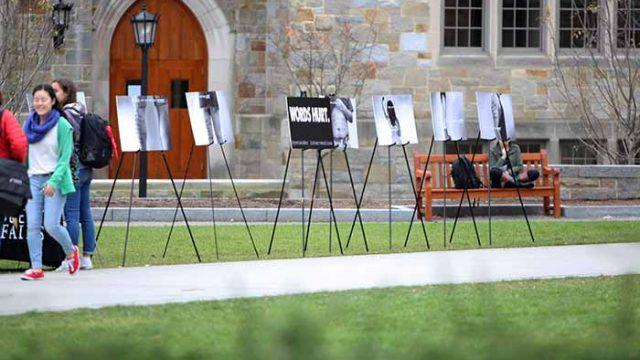
Boston College hosts students from over 90 countries worldwide, but many of their challenges as non-traditional students go largely unnoticed by the general community. International Education Week (IEW) aims to close that gap and bring awareness to the realities of being a foreign student in the United States.
The Wednesday night seminar, “Theory, Perception and Reality: Non-Traditional Experiences at a Traditional University,” brought together a panel of students from a variety of walks of life. All were considered “non-traditional” students, as they had some extenuating circumstances that took them off the usual American educational path.
Some of these circumstances included being a student continuing his or her education after a break of over a year, being over age 24, being a part-time student, or being financially independent. The Woods College of Advancing Studies exists to support and assist these students through a variety of programs and is a resource for many who face very different issues than the typical student.
The issues these students face and the solutions traditional institutions can find to support them is a growing field, as national trends show the “traditional” student population on the decline compared to these modern students.
“This is a great experience in life, something you’re always going to remember.”
-Sara Villanueva, WCAS ’21
“This is no longer a world of that 19-year-old in college that’s living on campus, that doesn’t have to work,” said Claudia Pouravelis, the associate dean of Enrollment Management at the Woods College. “The reality of higher education is that we’re seeing more non-traditional students.”
The concerns and experiences of these students are only increasing in relevance, Pouravelis said.
The panel consisted of four students—three undergraduates and one graduate. Two of the undergraduates were from South Korea, the second best-represented country on campus, after China.
As men, their unique concerns included a mandatory two-year service in the military, at risk of loss of citizenship. Bae Hyun Kang, WCAS ’18, is in his first semester at BC after his service in South Korea. He has always struggled with English, so he found it difficult to receive a full-immersion education after only speaking Korean for two years.
Jiwon Kim, MCAS ’18, who will leave campus for his service this winter, is applying to serve on an American military base to combat this problem. Despite the interruption to his education, he is excited to go to Korea and see his family. Although he has been in the U.S. for nine years and has not felt homesick, he was shocked by how his family has aged since he was gone and how much of each other’s lives they had missed.
Ismael Crotte, LSOE ’17, is from Mexico and graduated from the University of Houston in 1992. Coming back to college was a huge adjustment for him. Crotte shared some of the concerns the other students expressed. He finds it difficult to focus on academics when there are so many things going on in his life, including bills that must be paid, working a job, and family obligations. One of his family members from Mexico recently died, and he could not was unable to afford the flight home to attend the funeral, both financially and time-wise.
Sara Villanueva, WCAS ’21, is from El Salvador. She cited the lack of financial aid for undergraduate international students as a major issue. She is working two jobs to help her mother with tuition and can only afford to be a part-time student. But he education and people are definitely going to be worth it in the end, she said.
“This is a great experience in life, something you’re always going to remember,” Villanueva said.
Featured Image by Isabelle Lumb